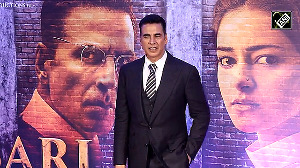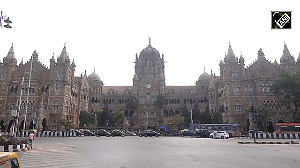Video killed the radio star. Back in the 1980s, this song by a British group hit the charts as a fitting tribute to the golden days of radio, which had been cut short by the television and video invasion.
Then in the 1990s, FM came to the rescue with some snappy content, and radio bounced back. All this while, and as it's always been, all radio services were free, at least in India. Until in 2000, when the US-based WorldSpace Inc rolled out its "paid" satellite radio service in the country.
WorldSpace's edge over conventional radio: its superior content - commercial-free programming, 24-hour music channels, each devoted to a particular genre, international news content from BBC, CNN, Bloomberg and so on, all delivered in a digital, CD-quality format.
Those were huge pluses for music lovers and avid radio listeners. But were they willing to pay for the privilege? After all, this was just radio.
In WorldSpace managing director Shishir Lall's words, the service met with "limited success" in the initial years. Subscription figures weren't exactly impressive. Four years after WorldSpace launched its Indian operations, it still had just 12,000 subscribers.
The track's changed now. In the past one year, WorldSpace has been able to reverse its sluggishness - it now boasts about 112,000 subscriptions, a dramatic five-fold increase over 23,000 this time last year. How did the turnaround come about?
Price play
Perhaps the biggest problem earlier was the newness of the concept of satellite radio based on "paid" services. Not just in India, but across the world no one really knew how the revenue and pricing models would work.
"In the initial years, we went through our trial-and-error phase. We tried business models that didn't deliver to expectations. But we were able to hang on to the marketplace," says Lall.
When WorldSpace was introduced in 2000, the company charged a lump sum price of between Rs 5,500 and Rs 12,000 for its radio receivers, bundled with access to service. All its programming was then free-to-air and revenues were based purely on the sales of the receivers.
In July 2002, however, it introduced subscription services for three new channels, and in January 2004, it completely revamped its model, making the entire service subscription-based. The company now charged Rs 3,790 for the receiver and Rs 1,800 as annual subscription.
The move primarily helped WorldSpace streamline its revenues, since in the earlier model the company had to share its revenue with the receiver-maker (BPL in India). There was another issue: a one-time payment for an indefinite service meant choking off a potential revenue stream from regular subscription fees.
By 2004, the company had also added 10 new channels to its initial bouquet of 20, mostly Westernised channels. Most of the new channels offered Indian content - WorldSpace now had some seven Hindi, two Tamil and one Malayalam channel.
While WorldSpace may have been moving in the right direction, it still lacked the numbers. Even until March last year, the company only had around 21,000 subscribers.
That's because while it had set its sights on a large, broadbased high-income, upscale user group, what it got was a niche segment, mostly music lovers from affluent sections who were familiar with the service and the content (either through its popularity abroad or word-of-mouth).
Things changed around August 2005 when the company dropped the entry price for its receiver and subscription, from about Rs 5,500 to Rs 1,999 (bundled with a three-month subscription).
"We subsidised the receiver's cost, bearing some of the cost," says Lall, adding, "A lower entry price-point has been a key reason for our subscriptions shooting up in the past eight-nine months."
Explains Arti Mehta, chief marketing officer, WorldSpace India, "There was a sizeable number that was familiar with WorldSpace and willing to try it, but was reluctant because of the relatively high price. The drop in price, coupled with a three-month subscription, allowed this large number to experience the service. Experience is crucial for the consumer to value the service."
Expanding the content was also high on the agenda. Greater Indian content, 40 channels that now went beyond music to include special interest areas such as sports and spirituality also helped draw in listeners.
Market it right
Not everyone agrees that pricing was such a major issue. Says Ernst & Young senior partner and media and entertainment industry practice head Farokh Balsara, "If people can pay for superior content on TV, they can do it for radio as well. Those who had heard WorldSpace swore by its content. Where the company lacked initially was in marketing and creating awareness about the brand."
That focus came last year during the festival season. The Rs 1,999-receiver, christened Diva, and three-month subscription scheme were marketed very aggressively. A high-decibel campaign covering television, print and outdoors concentrated on selling Worldspace's variety of channels and rich content.
"The idea was to make the most of the high-spending, end-of-year months," says Mehta. Around 39,000 people opted for the scheme in the last three months of the year.
This year's big-bang marketing tactic has been the signing of music composer A R Rahman as brand ambassador. WorldSpace has splashed out on a 360-degree promotion around Rahman, who features in print, television and multimedia campaigns for the company.
"The fact that 'he' listens to worldspace can influence listeners tremendously," believes Lall.
Experience matters
Even as WorldSpace waits for Rahman to do a Pied Piper act for it, it's reaching out to customers directly. The company claims that more than half of its marketing efforts is now concentrated on experiential marketing.
Says Lall, "With a concept as new and nebulous as WorldSpace, consumers start comparing it with different offerings in the market, be it FM radio, CDs, or music downloads. It becomes difficult to make them understand that at about Rs 5 a day for a year, they are actually getting access to rich music of their choice - for a sum they may be spending for a cup of tea."
For experiential marketing, WorldSpace focuses on three key verticals - getting people to experience the service at retail locations, at their homes and at corporate offices.
Among retail locations, engagements at shopping malls are a regular. The company's sales staff and marketing agencies usually set up a shop-in-shop unit where people can listen to the service through a kiosk, participate in contests, win prizes, ask questions, see a demo and, of course, sign up as a subscriber.
WorldSpace lounges are also being set up at prominent retail locations, mostly malls. Six such lounges are already functional (in Bangalore, Gurgaon, Hyderabad, Chennai and Kochi), where shoppers can sit back and listen to the radio service. So far these lounges have contributed to over 8,000 subscriptions.
A few months ago, the company also established strategic alliances with music retail chains Planet M and Music World, setting up shops-in-shops at the chains' 60 stores across nine cities.
Besides, it has also tied up with Cafe Coffee Day and Barista, which play music from WorldSpace stations. Signages at the two cafes point to WorldSpace music playing there, and even the bills have a small note on the same.
WorldSpace is also reaching out especially to whole groups of potential customers. The BPO crowd is a huge target, so the company sets up kiosks at prominent call centre locations and plays its music in their canteens. It's working, claims Mehta. "The response and actual conversion to buy the service has been the highest at corporates," says Mehta.
Then there are the upscale apartment complexes, in Delhi, Nodia, Gurgaon and Kolkata. Here, WorldSpace typically organises activities like music and quiz contests for children, while engaging their parents in a bit of experiential marketing, again.
Will all these efforts help Indians go radio ga-ga?






 © 2025
© 2025